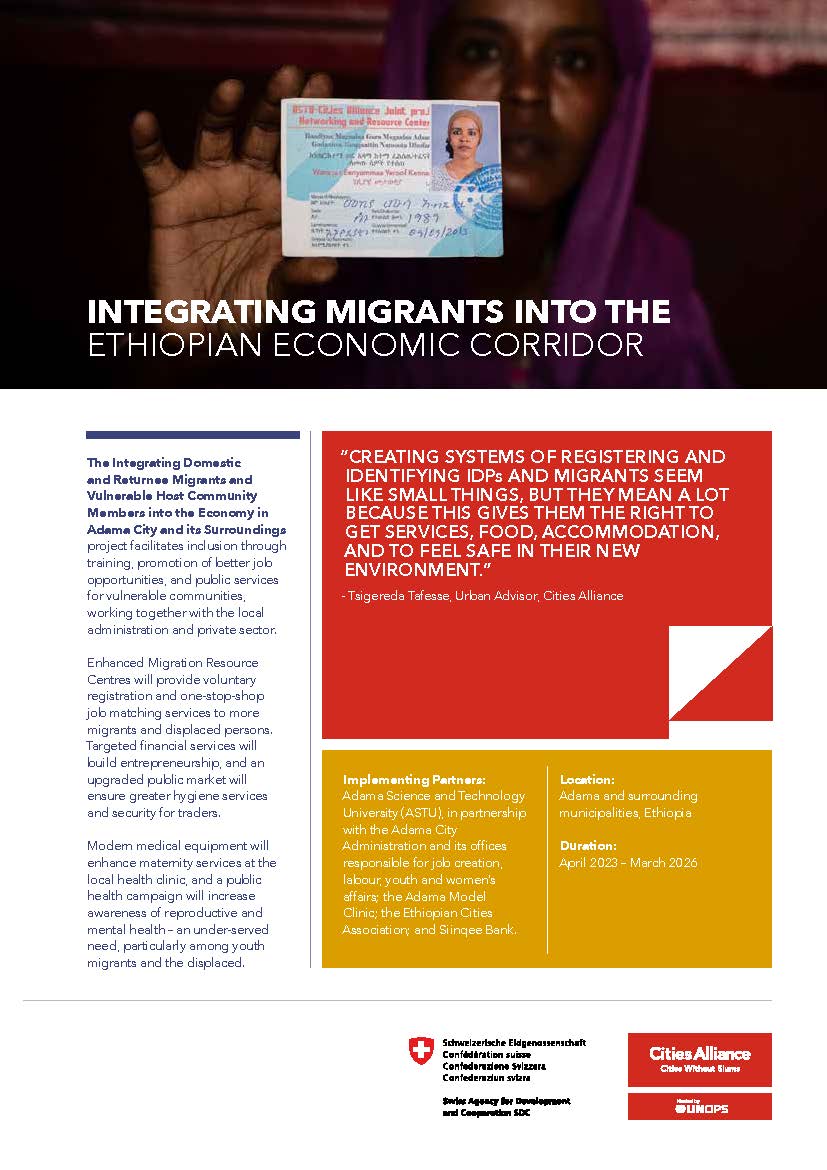Today, only 22 per cent of Ethiopia’s population lives in cities. This low urban population share, combined with population and strong overall economic growth, may lead to rapid migration flows and urbanisation over the next decade.
One area likely to be especially impacted is the Ethiopian Economic Corridor, which runs from the city of Adama – capital of the Oromia Region – through the towns of Bishoftu, Dukem and Modjo. Adama is especially challenged to absorb migrants and displaced persons, and city authorities are struggling to provide adequate services.
This project facilitates inclusion through training, promotion of better job opportunities, and public services for vulnerable communities, working together with the local administration and private sector.
The Ethiopian Economic Corridor
The corridor is strategically located on the main road linking Addis Ababa to the port of Djibouti, with numerous private and public enterprises and industries. The Ethio–Djibouti Railway, the Addis Ababa–Adama Expressway, and the Modjo Dry Port provide multimodal transportation capacity.
The corridor is experiencing rapid urbanisation and influx of people in search of jobs. Push factors include environmental degradation, low agricultural productivity, inadequate social services, demographic pressure, land shortages, lack of rain, recurrent drought, and conflict. Pull factors include public services, security, and job opportunities.

Partners
Adama Science and Technology University (ASTU); the Adama City Administration and its offices responsible for job creation, labour, youth and women’s affairs; the Adama Model Clinic; the Ethiopian Cities Association; and Siinqee Bank.
Activities
Enhanced Migration Resource Centres will provide voluntary registration and one-stop-shop job matching services to more migrants and displaced persons.
Targeted financial services will build entrepreneurship, and an upgraded public market will ensure greater hygiene services and security for traders.
Modern medical equipment will enhance maternity services at the local health clinic, and a public health campaign will increase awareness of reproductive and mental health – an under-served need, particularly among youth migrants and the displaced.
Anticipated Results
At least 10,000 migrants, forcibly displaced and vulnerable host community persons will benefit from services that enable them to access new or better work opportunities in Adama City and its surrounding rural-urban migration corridors.
Existing migration resource centres will be upgraded to increase the number of local, voluntary registration services and one-stop shop information for job matching and urban integration.
Financial literacy training and services will be provided by private sector partners to migrants and vulnerable community members to create new or strengthen existing businesses. Beneficiaries will include at least 60% women and 68% youth.
At least 2,800 job seekers connected with employers and 400 beneficiaries will receive initial capital through Siinqee Bank to start their own business activities.
Three local multi-stakeholder initiatives and dialogues among Ethiopian city networks organised in Adama and Bishoftu on the topics of industrialisation and inclusion of labour migrants, impact investments and decent work, and remittances and diaspora engagement.
At least 80,000 migrants, forcibly displaced, and vulnerable host communities will access basic municipal services because of the project.
Participatory upgrading of marketplaces and a youth centre will benefit both migrants and host community. The market, which was built as part of a previous project, will be upgraded with WASH facilities and fencing to increase both health and security for its users.
The Adama local clinic will be equipped with modern medical instruments for maternal health, benefitting migrants, displaced, and vulnerable host communities. A health campaign will increase awareness of reproductive and mental health. At least 50% of the beneficiaries will be female and at least 68% youth.
Four local initiatives and policy dialogues on inclusion and social cohesion (including durable solutions for forcibly displaced persons) will be organised to engage governments, private sector, and civil society.
- Adama will host the first dialogue on gender, migration, and women’s empowerment;
- Bishoftu will host the second on gender, migration and inclusive city development;
- Modjo will host the third on labour migration and psychosocial problems of female migrants/returnee migrants; and
- Adama will host the fourth dialogue on migration and city development.
A gender analysis and action research on selected gender issues will inform locally appropriate gender transformative action in the context of the Ethiopian Economic Corridor.
The project also focuses on the needs and opportunities of youth within Adama and its surrounding municipalities, building on the successes of its initial phase; 95% of the job seekers connected with employers in the Adama Industrial Park were female.
The project team will work closely with the Adama City Women and Children Affairs Office and the Youth Affairs Office to respond to the specific needs of women, youth, and children. The security and sanitation upgrades to the marketplace will benefit women, who make up 80% of its traders.
The Adama city administration is also demonstrating additional support towards women and youth transformative actions by refurbishing a public youth centre, which will include construction of a playground next door so that women can use the centre’s facilities with their children.


